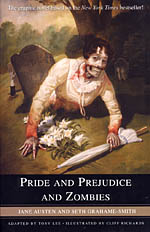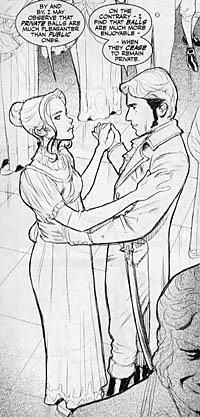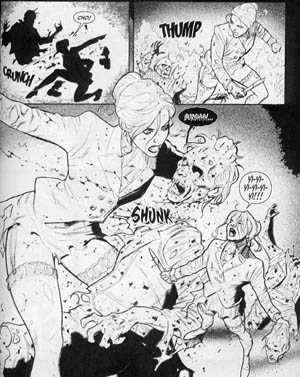 Based on the novel by Jane Austen and Seth Grahame-Smith
Based on the novel by Jane Austen and Seth Grahame-Smith
Script adapted by Tony Lee
Art by Cliff Richards
176 pages, black and white
Published by Del Rey
Pride and Prejudice and Zombies is a really funny idea, when you think about it; add a zombie invasion into the pages of Jane Austen’s classic novel Pride and Prejudice, but otherwise let the book generally play out as it did in its original form. There’s just one big problem with Seth Grahame-Smith’s transformation of Pride and Prejudice, though. This is a joke that cannot sustain itself for an entire novel. As the book moves forward, it starts to drag and the jokes grow increasingly tiresome and old. But with all that in mind, I was actually looking forward to the graphic novel adaptation of Pride and Prejudice and Zombies, because it would almost certainly be shorter, and that meant that it might not wear out its welcome the way that the novel does.
 The good news first: Pride and Prejudice and Zombies as a graphic novel definitely doesn’t feel as long as the prose novel. In his adaptation, Tony Lee has chopped down the plot somewhat, letting it flow slightly quicker and more smoothly. He understands the need for expediency, and for that I thank him. At 176 pages, the adaptation is definitely the superior of the two in that regard. Lee also makes sure to keep the basic structure intact, and while a lot of Austen’s prose is lost by the very nature of transforming it from a book to a graphic novel, I do feel that on the whole he manages to keep the general feel around.
The good news first: Pride and Prejudice and Zombies as a graphic novel definitely doesn’t feel as long as the prose novel. In his adaptation, Tony Lee has chopped down the plot somewhat, letting it flow slightly quicker and more smoothly. He understands the need for expediency, and for that I thank him. At 176 pages, the adaptation is definitely the superior of the two in that regard. Lee also makes sure to keep the basic structure intact, and while a lot of Austen’s prose is lost by the very nature of transforming it from a book to a graphic novel, I do feel that on the whole he manages to keep the general feel around.
On the other hand, there are places where Lee removes what perhaps should have stayed, and keeps what should have gone. One of the funniest early moments in the book involves a sudden zombie attack during a ball, and the five Bennet sisters forming the "pentagram of death." It’s the first big shift in Pride and Prejudice and Zombies from the original source material, and Grahame-Smith understands the need to make that scene stand out as both similar yet different from Pride and Prejudice. In the adaptation, though, the entire scene is over in one and a half pages. It feels like an afterthought, and to say that I was disappointed was an understatement. It’s all the more frustrating because there are sections later on that could have just as easily been left out, to help deliver that early, initial punch to the reader’s expectations.
More frustratingly, in the novel Grahame-Smith starts resorting to double entendres involving men using the word "balls" in conversation, over and over again, to try and grab people’s attention. The problem is, it’s not even funny the first time, and the book ends up being a deterrent instead of something exciting. (Never so much will you wish for a zombie invasion to try and spice things up, and this is the book where that should actually happen.) Lee keeps this most-purile form of humor in the book, something that’s especially notable because while the zombie attacks generally try to ape Austen’s writing style, this stands out like a sore thumb.
 Cliff Richards draws the adaptation of Pride and Prejudice and Zombies with nice figure work; his women are a good mixture of capable and beautiful, and the men are appropriately dashing. Looking at Richards’ art, his pencils are a smart choice for this book and I’m glad they brought him on board. Unfortunately, it’s reproduced directly from his pencils, which I think is a mistake. Many of the pages look faded and unfinished as a result, as if they were drawn with the idea of either an inker or a colorist to come on board and finish the job. It ended up being a turn-off, which is a problem that I don’t think falls under Richards’ responsibility. It looks like it was drawn with the idea of someone else adding a little extra solid nature before going to print, and that process never occurred.
Cliff Richards draws the adaptation of Pride and Prejudice and Zombies with nice figure work; his women are a good mixture of capable and beautiful, and the men are appropriately dashing. Looking at Richards’ art, his pencils are a smart choice for this book and I’m glad they brought him on board. Unfortunately, it’s reproduced directly from his pencils, which I think is a mistake. Many of the pages look faded and unfinished as a result, as if they were drawn with the idea of either an inker or a colorist to come on board and finish the job. It ended up being a turn-off, which is a problem that I don’t think falls under Richards’ responsibility. It looks like it was drawn with the idea of someone else adding a little extra solid nature before going to print, and that process never occurred.
Pride and Prejudice and Zombies should have been a great graphic novel, but at the end of the day it’s just so-so. It feels like a lot of wrong decisions were made in the process of adapting it from book to comic, and it’s a shame that it wasn’t as strong as its potential. When it’s all said and done, the good parts still shine through, but there are enough distractions and missteps to keep it from finally getting to be as fun as the original concept promised.
Purchase Links: Amazon.com | Powell’s Books
